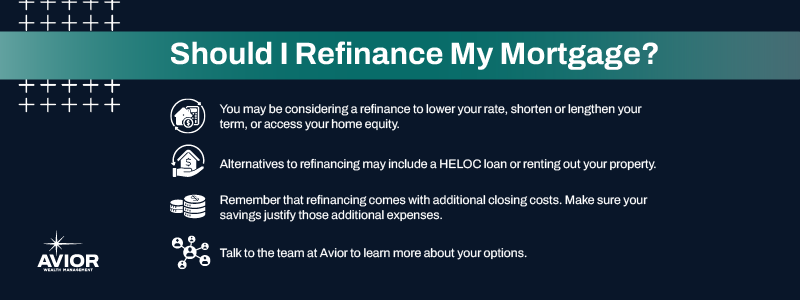Should I Refinance My Mortgage?
Refinancing is a big step that requires careful consideration. Learn how to decide whether refinancing is right for you.

It’s no secret that the housing market remains expensive, largely due to the Federal Reserve’s fight against inflation. But what goes up, must come down, and when mortgage rates start declining, the question of whether to refinance comes into play.
But declining mortgage rates aren’t the only reason to consider refinancing your mortgage. Perhaps you’ve found more favorable loan terms or adjusting your long-term investment strategy.
Regardless, every homeowner’s situation is different. That’s why, in this article, we’ll guide you through the motivations for, the process of, and some cautions against refinancing.
Let’s start by answering a basic question: Why refinance in the first place?
Motivations for Refinancing
Homeowners refinance for a variety of reasons. The ultimate goal of refinancing is to adjust your loan terms in a way that positions you favorably for the future.
Consider these common motivations:
- Getting a lower interest rate: When interest rates go down, it may be helpful to refinance to take advantage of those lower rates. This can significantly improve your mortgage payment and even your payoff timeline.
- Shortening your loan’s term: You may also be able to shorten the term of the loan if you’re in the right financial standing to pay it off faster. However, this usually means a higher mortgage payment.
- Lengthening your loan’s term: On the flip side, if you want to lower your monthly payment or give yourself more time to pay your mortgage off, you can refinance to lengthen your loan’s term.
- Removing mortgage insurance: You may have had to incur the cost of private mortgage insurance if your initial down payment was lower than 20%. If you’ve built up 20% equity in your home, you may be able to refinance and remove that extra expense.
- Tapping into your home equity: If you need some more cash, refinancing can allow you to tap into your home equity for extra liquidity. This is called a cash-out refinance.
Before refinancing, you should always consult a financial advisor to ensure you’re making the right move, the right way, the first time. Mistakes can be expensive to fix.
Interest Rate Trends to Know
Staying abreast of interest rate trends is crucial for refinancing regardless of your initial motivation. Recently, mortgage rates fell below 6.5% in August, the lowest they’ve been in almost 15 months.
Despite this decrease, prospective homeowners are still struggling to enter the market. Many are waiting to see what will happen in September with the supposed rate cut signaled by the Federal Reserve.
Those who managed to land an extremely low mortgage rate back in 2020 or 2021 are most likely not looking to refinance at the moment. In fact, about two-thirds of mortgage borrowers are paying rates under 4% right now.
Keep in mind that refinancing is not “free.” You must ensure that the savings you’ll ultimately gain from your refinancing will be enough to justify the costs.
Available Alternatives to Refinancing
Depending on your financial goals and home situation, you have other options besides refinancing.
When you want to access some of your home’s equity, other options aside from refinancing include a home equity loan or home equity line of credit (HELOC), which allows you to borrow against your home equity. You can often secure a better interest rate with a HELOC than refinancing.
If you’re struggling to pay your mortgage and need an alternative to refinancing, another alternative could be selling your home to look for a more affordable option or renting it out to bring in some extra income.
Cautions Against Refinancing
Is refinancing always the right answer? No.
Keep in mind that you’ll have to pay closing costs again when you refinance, which could cost you at least a few thousand dollars.
Calculate whether the savings you’ll get from refinancing are worth those additional costs. Think about how long you’re likely to stay at the property to determine how long it will take you to break even.
Also, if your goal is to shorten your mortgage term, you may have to pay a higher monthly payment to get the mortgage paid off faster. This will likely be true even if you manage to land a lower interest rate, as your principal mortgage payments will increase.
Finally, consider that pursuing cash-out refinancing will reduce your home’s equity, which isn’t the right move for everyone.
Get Your Refinancing Questions Answered With Help From Avior
You should also consult an expert first before making any refinancing moves. A financial professional will help you understand the current economic climate, answer questions you may not have thought of, and help you time the refinance properly to keep your financial well-being in good shape.
The team at Avior is here to help you pursue your purpose. We understand the changes life can bring that may lead to a refinancing discussion.
We take the time to get to know you and your family’s unique situation, so we can properly guide you through the process of refinancing or finding an alternative.
Reach out to Avior today for a one-on-one consultation.
Disclaimer: Nothing contained herein should be construed as legal or tax advice. Avior and our Advisors will work with your attorney and/or tax professional to assist with your legal and tax strategies. Please consult your attorney or tax professional with specific legal and/or tax questions. Investment Management and Financial Planner are offered through Avior Wealth Management, LLC, an SEC-registered investment advisor. Past performance is not a guarantee of future results. Investments are subject to loss, including the loss of principal.
No Comments
Sorry, the comment form is closed at this time.




